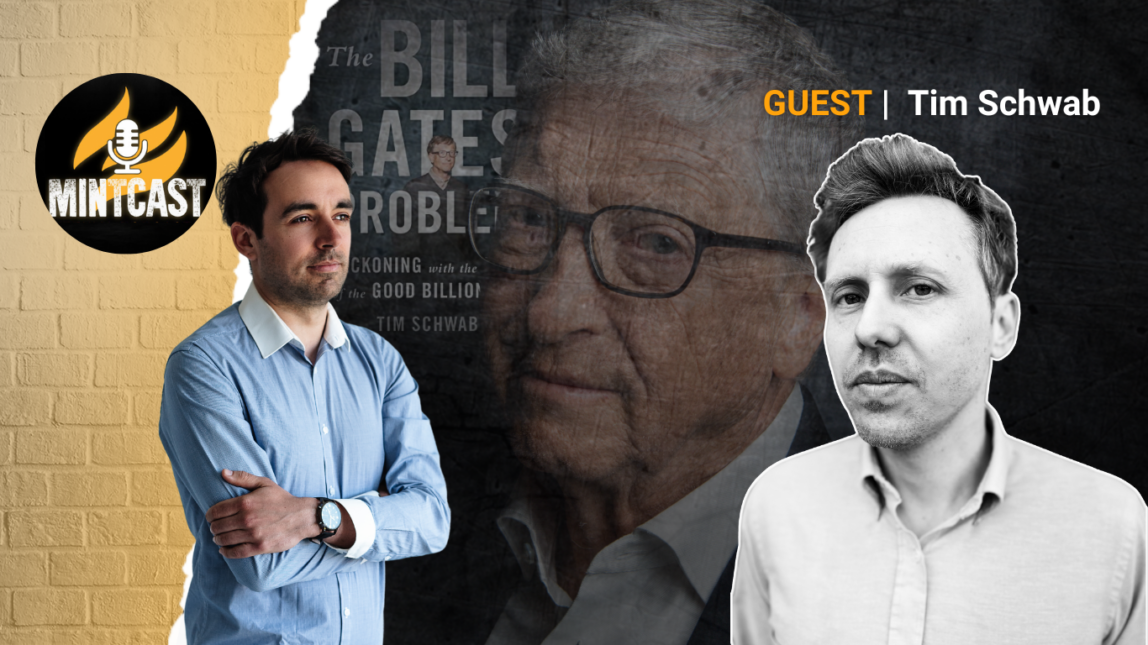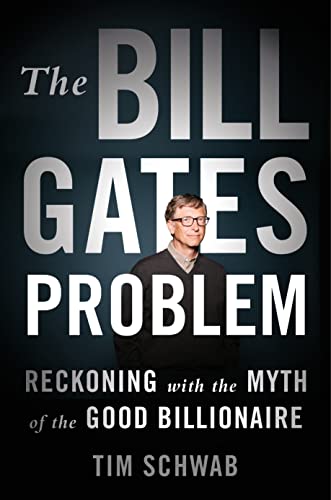
Compilation image depicting Alan MacLeod (Left) and Tim Schwab (Right) over a backdrop of Bill Gates. Photo: MintPress.

Orinoco Tribune – News and opinion pieces about Venezuela and beyond
From Venezuela and made by Venezuelan Chavistas

Compilation image depicting Alan MacLeod (Left) and Tim Schwab (Right) over a backdrop of Bill Gates. Photo: MintPress.
By Alan MacLeod – Feb 21, 2024
There are few people on Earth richer or more influential than Bill Gates. For many years, the former Microsoft CEO was the planet’s most wealthy individual and used his power to corner and monopolize as much of the tech industry as he could. From there, Gates has moved to become perhaps the most powerful man in global health, agriculture and education.
And yet, for all of his power and prestige, Gates is rarely scrutinized in our media. The Seattle native has been careful to cultivate an image of a well-meaning nerd who uses his wealth for good. Our guest today on the “MintCast” is an exception to that rule, being one of the few investigative journalists to critically examine Gates’ power and influence. Tim Schwab is an award-winning investigative journalist based in Washington, D.C. His reporting has been published in outlets such as The Nation, The Columbia Journalism Review, The Baffler and Jacobin magazine. His latest book, “The Bill Gates Problem: Reckoning with the Myth of the Good Billionaire,” was published in November.
Today, Schwab joins “MintCast” co-host Alan MacLeod to discuss Gates’ origin story, how he uses his enormous wealth to negatively influence public health and education policy, his connections to disgraced child trafficker Jeffrey Epstein, and to ponder whether there is ever such a thing as a good billionaire.
Gates’ influence on health policy became evident during the COVID-19 pandemic, when he used his funding connections to Oxford University to pressure the institution into their groundbreaking vaccine, telling them that only by partnering with a private corporation could they achieve their goals. Almost as soon as Oxford partnered with AstraZeneca, the latter announced that they would fall dramatically short of the vaccine production figures they had promised, leading to a massive dearth of vaccines for people worldwide, causing untold suffering.
Bill Gates Failed Effort To Feed Africa: Was He Even Trying To Help in the First Place?
 Schwab also told MacLeod today about the extraordinary influence that Gates’ billions had over the World Health Organization (WHO). As he wrote:
Schwab also told MacLeod today about the extraordinary influence that Gates’ billions had over the World Health Organization (WHO). As he wrote:
One reason that the WHO didn’t have the expertise or capacity to manage the pandemic is that its authority had been eroded by the rise of the Gates Foundation. Gates has far more money than the WHO and has taken over key functions of its work. The foundation had also become the second-largest funder of the WHO, which allowed it to shape what the organization worked on and what it didn’t.”
Few know about Gates’ negative influence on global health, however, partially because the media rarely report on it. This is down in no small part to the hundreds of millions of dollars he and his foundation have lavished upon newsrooms across the United States and around the world. Gates is a major funder of many of the most well-known and influential outlets globally, including The New York Times, CNN, NBC, The Atlantic, NPR, PBS, the BBC, Al-Jazeera, El País and Le Monde. MintPress, however, will continue to hold the powerful to account, even if corporate media refuse to do their job.

Alan MacLeod is a member of the Glasgow University Media Group and a Senior Staff Writer for MintPress News. After completing his PhD in 2017 he published two books: Bad News From Venezuela: Twenty Years of Fake News and Misreporting and Propaganda in the Information Age: Still Manufacturing Consent, as well as a number of academic articles. He has also contributed to FAIR.org, The Guardian, Salon, The Grayzone, Jacobin Magazine, and Common Dreams.
You must be logged in to post a comment.